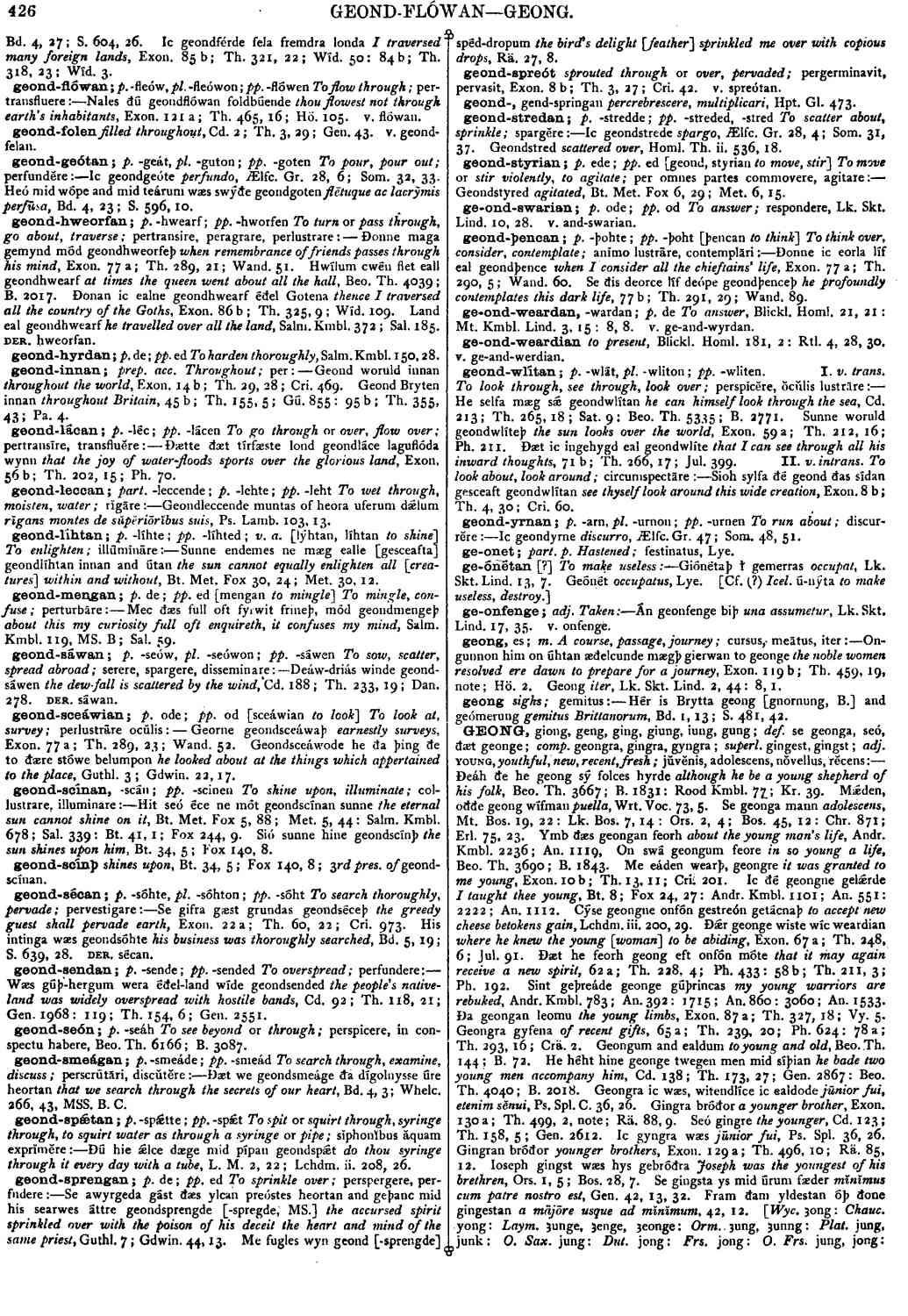GEONG
- adjective
-
Ðeáh ðe he geong sý folces hyrde
although he be a young shepherd of his folk,
- Beo. Th. 3667; B. 1831: Rood Kmbl. 77; Kr. 39.
-
Mǽden, oððe geong wífman
puella,
- Wrt. Voc. 73, 5.
-
Se geonga mann
adolescens,
- Mt. Bos. 19, 22: Lk. Bos. 7, 14: Ors. 2, 4; Bos. 45, 12: Chr. 871; Erl. 75, 23.
-
Ymb ðæs geongan feorh about the young man's life, Andr. Kmbl. 2236; An. 1119, On swá geongum feore
in so young a life,
- Beo. Th. 3690; B. 1843.
-
Me eáden wearþ, geongre
it was granted to me young,
- Exon. 10 b; Th. 13, 11; Cri: 201.
-
Ic ðé geongne gelǽrde
I taught thee young,
- Bt. 8; Fox 24, 27: Andr. Kmbl. 1101; An. 551: 2222; An. 1112.
-
Cýse geongne onfón gestreón getácnaþ
to accept new cheese betokens gain,
- Lchdm. iii. 200, 29.
-
Ðǽr geonge wiste wíc weardian
where he knew the young [woman] to be abiding,
- Exon. 67 a; Th. 248, 6; Jul. 91.
-
Ðæt he feorh geong eft onfón móte
that it may again receive a new spirit,
62 a;- Th. 228. 4; Ph. 433: 58 b; Th. 211, 3; Ph. 192.
-
Sint geþreáde geonge gúþrincas
my young warriors are rebuked,
- Andr. Kmbl. 783; An. 392: 1715; An. 860: 3060; An. 1533.
-
Ða geongan leomu
the young limbs,
- Exon. 87 a; Th. 327, 18; Vy. 5.
-
Geongra gyfena
of recent gifts,
65 a;- Th. 239, 20; Ph. 624: 78 a; Th. 293, 16; Crä. 2.
-
Geongum and ealdum
to young and old,
- Beo. Th. 144; B. 72.
-
He héht hine geonge twegen men mid síþian
he bade two young men accompany him,
- Cd. 138; Th. 173, 27; Gen. 2867: Beo. Th. 4040; B. 2018.
-
Geongra ic wæs, witendlíce ic ealdode
jūnior fui, etenim sĕnui,
- Ps. Spl. C. 36, 26.
-
Gingra bróðor
a younger brother,
- Exon. 130 a; Th. 499, 2, note; Rä. 88, 9.
-
Seó gingre
the younger,
- Cd. 123; Th. 158, 5; Gen. 2612.
-
Ic gyngra wæs
jūnior fui,
- Ps. Spl. 36, 26.
-
Gingran bróðor
younger brothers,
- Exon. 129 a; Th. 496, 10; Rä. 85, 12.
-
Ioseph gingst wæs hys gebróðra
Joseph was the youngest of his brethren,
- Ors. 1, 5; Bos. 28, 7.
-
Se gingsta ys mid úrum fæder
mĭnĭmus cum patre nostro est,
- Gen. 42, 13, 32.
-
Fram ðam yldestan óþ ðone gingestan
a mājōre usque ad mĭnĭmum,
- 42, 12.
Bosworth, Joseph. “GEONG.” In An Anglo-Saxon Dictionary Online, edited by Thomas Northcote Toller, Christ Sean, and Ondřej Tichy. Prague: Faculty of Arts, Charles University, 2014. https://bosworthtoller.com/15554.
Checked: 0